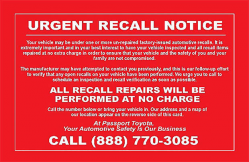
— Fake recall notices have caused DC-area car dealers to settle a Federal Trade Commission (FTC) complaint that accuses the dealerships of mailing more than 21,000 fake "urgent recall" notices to consumers in 2015 and 2017.
According to the FTC, the dealers and a marketing firm agreed to settle the deceptive advertising charges that allege the notices were mailed to convince car owners to visit the dealerships.
The car dealers do business as Passport Toyota, Passport Nissan of Alexandria, Virginia, and Passport Nissan of Marlow Heights, Maryland. The marketing company, Temecula Equity Group, LLC, does business as Overflowworks.com and is located in California.
Considering the huge number of vehicles on the roads that have open (unrepaired) recalls, the government has taken measures to combat fake recall notices sent by companies to convince owners to visit dealerships. The National Highway Traffic Safety Administration (NHTSA) estimates 30 percent of drivers completely ignore recall notices, even if the safety defects could cost lives.
In 2014, NHTSA announced that all manufacturers must use distinctive labels for recall mailings to consumers, using white, uppercase letters against a red background.
According to NHTSA, the recall label is intended to "help protect consumers from misleading sales and marketing materials that mimic, in their wording and presentation, legitimate safety recall alerts from manufacturers that can lead owners to purchase costly products and services that have no connection to a legitimate safety recall."
However, the FTC says the DC-area car dealers sent fake recall notices that used the same color scheme as official notices sent by automakers. The government says the vast majority of vehicles covered by the fake recall notices did not have open recalls, even though the notices said, “URGENT RECALL NOTICE” in large, bold-faced uppercase letters.
On the reverse side it said, "VEHICLE RECALL NOTICE" and "WARNING" in large red and black bold-faced, uppercase letters on a white background.
The FTC complaint alleges Passport first sent about 7,000 Toyota fake recall notices in 2015, then the dealers sent about 14,000 notices to Nissan customers in June 2017. Those fake notices were mailed even though numerous complaints were made after the first notices were sent in 2015.
The government says hundred of vehicle owners contacted the Passport dealerships and were told the cars needed to be brought to the dealers to learn whether the cars had unrepaired recalls. In addition, the FTC says some of those car owners paid for repairs that had nothing to do with recalls.
While the FTC alleges the notices were mailed to increase business at the service departments of the dealerships, Passport claims the fake recall notices were mailed in an attempt to "correct unrepaired vehicles subject to a recall and it was not our intention to mislead anyone."
But although Passport says it mailed the notices to "correct unrepaired vehicles subject to a recall," the company also says "open recalls were unavailable to Passport or other dealerships." Passport further says the language used on the fake recall notices "was not created by Passport—it was originated by a California company unrelated to our business."
By agreeing to settle the allegations, Passport and Temecula Equity Group are "permanently prohibited from misrepresenting, expressly or by implication: 1) whether any motor vehicle is subject to an open safety recall or service campaign, or 2) certain other material facts about motor vehicles."




